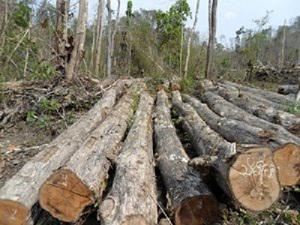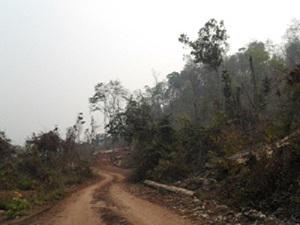Mai Yourke Khoure
The aims of the project is to promote reforestation, take action on environmental issues and to spread awareness about how to respect and protect the environment in this time of environmental crisis.
To raise awareness in the communities of how to have sustainable livelihoods. To use their livelihoods within their natural resources and to maintain their forest.

The project coordinator and project assistant went back inside the Ta’ang area to implement the project activities in the first week of March 2011. We held a meeting with TSYO Inland Working Coordinator and some staff on the China-Burma border. We discussed the strategy of the research in the three townships and how we were going to select participants to join the training. After the meeting, the project coordinator and Assistant went to Namkham, Mantong and Namhsan Townships to do the research. In the research field area, we got the opportunity to meet with the community leaders, youth leaders and local people. We interviewed and talked with them about the situation of deforestation that is taking place in the Ta’ang region of northern Shan State Burma.

We researched and interviewed with community people from March to June 2011 in the three townships and interviewed 30 local people. There is different kinds of deforestation were the majority of local people’s livelihoods depending on hillside cultivation, tea harvesting, charcoal produce and logging. There is an increase in logging exports to neighbouring countries like China and Thailand. The local people cut down the forests to produce the Charcoal to pay for their daily food. A lot of local people in Namkham and Mantong Townships are producing charcoal and trade it to China-side. Charcoal production is becoming more lucrative because of the current low Tea prices in the Ta’ang area. There has been a huge amount of logging as a result of the development projects in which the Chinese companies and the military government cooperated to build more dams on the Shweli River in the Ta’ang area. During the field research we were able to build networks with local people in different villages to encourage them to work together to protect the environment from the mega development project Ta’ang areas.
The Inland working staff arranged and prepared for the training on the China-Burma border. We selected the training participants from different villages of the three townships that were researched and there were 12 participants that attended the one month training. We held the training on the 1st August 2011 on the China-Burma border. We tried to select the local people who were very strong and interested to learn about the environment and some participants were chosen by the community people. We provided training on the environment, Climate change, dam impact and updates about the deforestation from the research before the training. The training was successfully completed and all the training participants went back to their villages to share their knowledge to other local people in the Ta’ang area.